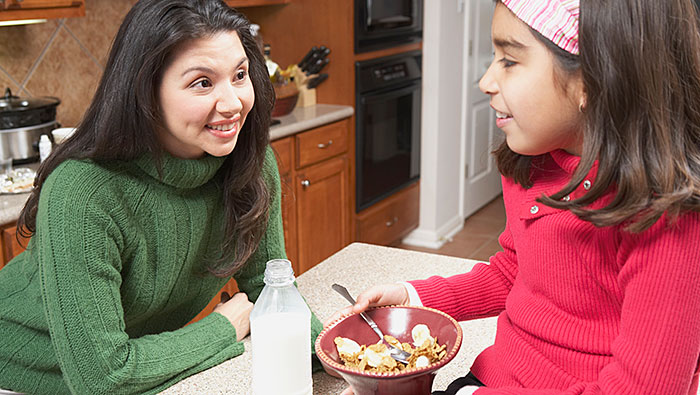How to Talk to Your Kids About Heart Disease

You or your partner has just been diagnosed with heart disease. How will you tell your kids?
First, realize that this will not be one conversation; it will be a series of conversations, says Dr. Jennifer Connor-Smith, a clinical psychologist based in Portland, OR. Prepare what you want to say and end the conversation with an open-door policy. Also, make sure to get started sooner rather than later.
“It is easy for parents to get hung up on the possibility that they might say something wrong, and then end up putting off the conversation,” she says. “It is important to know that not quite the perfect thing said with love and good intentions is better than a conversation that never happens.”
Here’s how to get started:
-
Pick a good time
When is your child most receptive to serious conversation? Right before bed? On a car ride? On a walk around the neighborhood? Connor-Smith recommends thinking carefully about the best time to have a conversation before launching in. -
Give information piece by piece
Not all kids will jump to the “are you going to die?” conversation. Some of them will have more practical questions. They may want to see a model of a heart to understand what is happening. Others will want to know if your disease means a cancellation of next week’s vacation.
Let out information slowly and then wait for questions to come.
“When children ask questions, ask them to tell you what they are thinking about or if they have a special worry on their mind at the moment,” she recommends. “The more information you can get from them, the better you will understand what they are thinking.” -
Explain it’s not their fault
Since some children may blame themselves for a parent’s disease, it is important to be clear about their lack of fault.
“Younger children may worry that they caused your heart disease because they may have said, ‘I hate you’ in the past when they were angry,” says Connor-Smith. “Make sure to tell them that the disease is not their fault and that there are things you can do to make things better, like exercising and eating healthy.” -
Make them feel secure
Negative health news can cause children to worry about a change in daily routine, says Connor-Smith. Abate these fears by explaining what day-to-day changes to expect and how long they will last — from who will pick them up at school when you are at a doctor’s appointment, to who will pack their favorite lunch.
“This is a great place to accept help from friends,” she says. “If they offer, ask them to help pack lunches and pick up your kids from sports practices. It will help your children cope if you can keep their routines in order.” -
WARNING: Do not talk about your concerns
According to Connor-Smith, the biggest mistake parents can can make is to share their personal concerns with their children, e.g. the financial cost of treatment and how it will affect one’s profession.
She says, “Those things need to stay adult concerns. They should not be shared with children; they will only make the child feel more anxious and helpless.”





